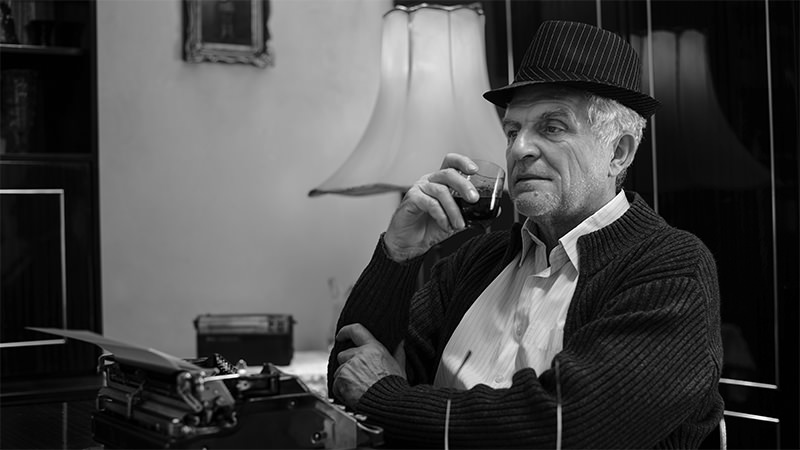The notion of Writer-As-Sot is a cinematic cliché.
In the movies, writers – particularly best-selling writers – typically divide their days by employing a strict temporal template: minutes allocated to producing paragraphs, hours devoted to pickling their livers.
The story-line is predictable: attempts to create The Great American Novel are met with massive writer’s block (a pseudo-affliction: The late detective novelist Robert B. Parker responded to a question about block with “When you have a clogged drain, do you wait until the passing of Plumber’s Block?”). Creative logjam is then “remedied” by bouts of heroic drinking which instigate bursts of cringe-worthy anti-social behavior that shred relationships. Debauchery is capped by a night spent splayed over the keyboard, babbling and drooling.
The following morning, our bottle-is-mightier-than-the-pen dude wakes up bleary, wasted and excruciatingly hung-over. A graphic vomiting scene ices the cake. Finally, after downing a couple of Bloody Mary’s, Besotted Scribe manages to sneak in a tad of typing before lurching off, yet again, to the Delirium Tremens Derby.
In the movies, writers – particular best-selling writers – are destined to end up as incoherent wastes of space who fritter away their gifts, their fortunes, and, ultimately, their lives.
Part of the stereotype may be rooted in what psychoanalysts call “projection” – attributing one’s own hang-ups to other people. Movies are written by screenwriters, a group whose status is illustrated by the old joke: “Did you hear about the mentally-challenged starlet who got off the bus and looked for a writer to sleep with?”
Even if script-jockeys don’t start off hitting the bottle, working under the venal types who gravitate toward the “the industry” can be enough to drive anyone to drink. And perhaps jealousy leavened by schadenfreude is also a factor. Might I go out on a limb and suggest that many screenwriters fantasize about replacing the pseudo-collaborative peonage of churning out zippy dialogue to some accountant’s specifications with the opportunity to sit in a room and create the solo works known as novels? E.g. to serve as producer, director and star?
But in fairness to screenwriters, they’re onto something. Anecdotal evidence of noted novelists who’ve wrestled with substance abuse is beyond ample: Hemingway, Faulkner, Fitzgerald, Parker, Joyce, Poe – need I go on? And if substance abuse is thought of as self-medication for emotional problems, a body of research indicating dramatically higher rates of unipolar depression and bipolar disorder in those who create words for a living backs up anecdote with data.
A high rate of mood problems is particularly evident in poets, playwrights and, to a slightly lesser extent, novelists. Interestingly, it is far less dramatic in nonfiction writers, leading some to hypothesize that reportage is a neuropsychological activity distinct from master story telling and that it is the ability to fantasize for a living that in some yet unexplained way, correlates with affective dysregulation.
However.
A danger exists in assuming that the link between writing fiction and alcoholism is inevitable and, worse, a prerequisite for literary success. Quite the opposite. Many successful novelists have no issue with depression or booze. And writers who succumb to substance abuse typically see their talent disintegrate.
Just like in the movies.
So it’s okay for young aspiring writers to view all those tragic flicks as morality plays but it’s a huge mistake to interpret them instructional manuals.
You don’t need to be a boozehound to enter the club. You don’t need to adopt The Writer’s Life – there is no such thing.
Writing fiction for a living may be the best job in the world – I certainly think it is – but in the end it’s still a job. So while talent is necessary, it’s far from sufficient: the successful writer – the writer who merits a long, satisfying career – is disciplined, hard-working and sufficiently respectful of his/her art to approach it with a clear head.
The healthier the writer, the more productive he/she will be.
Truck out a feral-child like Hunter S. Thompson in refutation of that? I suggest you give Thompson’s oeuvre a careful review. You might find that much of what he produced at his most stoned boils down to childish incoherence that will not withstand the test of time.
But he did make an interesting character in the movies.
Happy Creativity.
Jonathan Kellerman, is a clinical psychologist, medical school professor, and the author of numerous essays, scientific publications, short stories, and 46 books, including 39 best-selling crime thrillers. He has been known to enjoy an occasional Manhattan on the rocks. His latest novel is THE MURDERER’S DAUGHTER (Ballantine).

